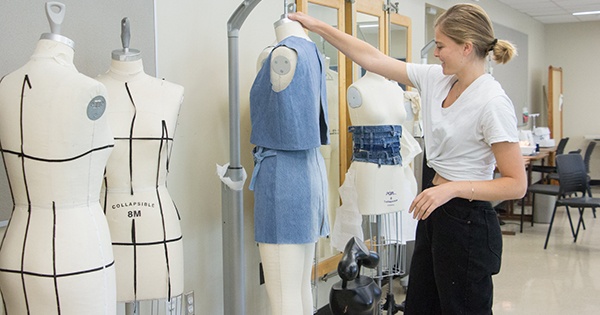
Apparel from recycled jeans, lubricants from renewable carbon and housing for the homeless from straw bales are among the sustainable and eco-friendly products being developed by University of Delaware Horn Entrepreneurship ventures. Companies like AndAgain, RiKarbon and Y Innovations speak to the commitment of the university to maintain and take care of the environment.
AndAgain
AndAgain, founded by Morgan Young and Greg Harder, recycles old jeans and rescues dead stock fabrics to create unique, handmade denim wear that leaves almost no footprint on the environment. The company produces bomber jackets, a wide variety of jeans and small run shirts and skirts.
“Instead of just being a typical fashion company, we have a really heavy focus on sustainability,” explained Young. “Because of all the new fabric used in fashion there is a ton of waste, but we use pre-existing jeans to create all of our garments. We save thousands of gallons of water and raw fabric resources in the process.”
The idea for AndAgain stems from the founders’ love for fashion and eagerness to innovate. The fashion industry is one of the most wasteful in the world, but the designers flipped this weakness into one of their biggest strengths and main selling points.
“The idea of sustainability provided the driving force for us to find a home for all of these wasted resources,” said Harder. “The experience from working with these clothes has impacted us down to our day-to-day decisions,” he explained. “We are constantly thinking of little ways we can be more friendly to the environment.” Also, “Sustainability really drives innovation,” said Young. “By focusing on sustainability, we have set the precedence of innovation from our business decisions to our designs.”
RiKarbon
RiKarbon, founded by Basudeb Saha, is rolling out products made from renewable carbon to increase sustainability and minimize adverse effects on the environment.
“The name RiKarbon means renewable carbon,” said Saha. “Our mission and vision is to use the abundant supply of renewable carbon to make high-value and cost-competitive specialty products that are currently operating on petroleum.”
The first product to market, which originated from research at the Catalysis Center for Energy Innovation at the University of Delaware, focuses on lubricants. “Our biolubricant products from plant matters and natural oils have multiple high-performance applications in hydropower production, marine equipment, nuclear power production, aircrafts, agriculture equipment, cars and consumer and industrial machinery,” said Saha.
The biotech venture ditches conventional feedstock and all of its adverse effects by using renewable carbon. The new technology provides greater potential for increased innovation and efficiency.
“Using renewable carbon as opposed to conventional crude oil improves alternate supply chain and feedstock flexibility,” said Saha. “Greenhouse and carbon emissions would be largely minimized, and our biodegradable products reduce environmental footprint.”
Y Innovations
Y Innovations, founded by Brennan Stark, builds environmentally friendly housing for homeless families. After tests with other structures, the startup broke ground this month on its first house on North Jefferson Street in Wilmington, Delaware. The social venture broke ground on its first project in Oxford, Michigan in conjunction with The Natural Cottage Project in order to gear up for future construction.
About Horn Entrepreneurship
Horn Entrepreneurship serves as the University of Delaware’s creative engine for entrepreneurship education and advancement. Built and actively supported by successful entrepreneurs and thought leaders, Horn Entrepreneurship empowers aspiring innovators and entrepreneurs as they pursue new ideas for a better world.

